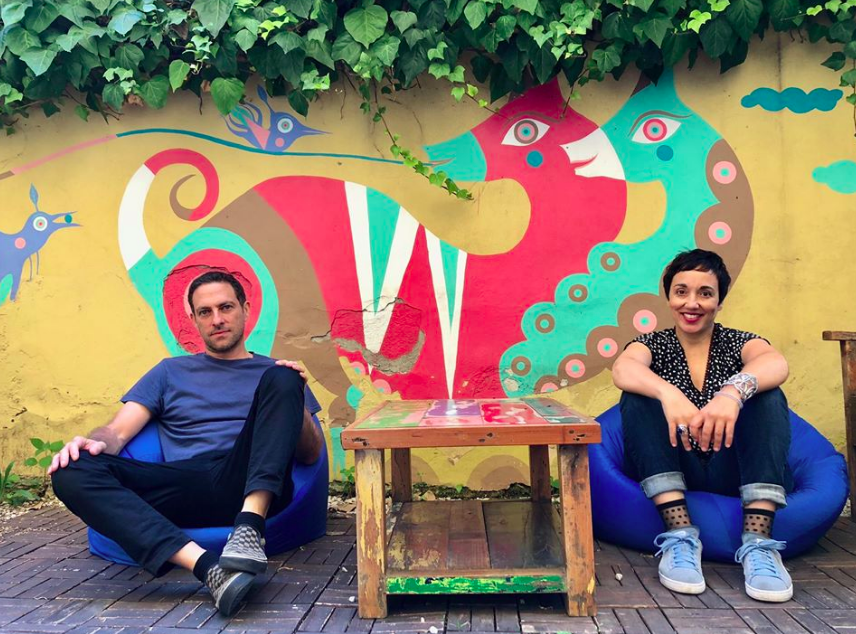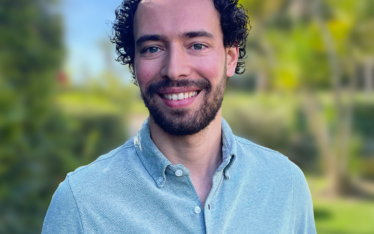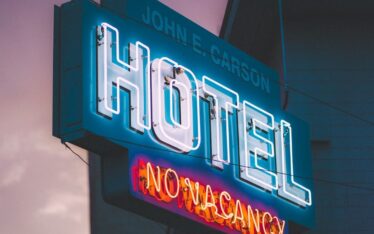You will know by now that one of our favourite things about working in the travel industry is the people we meet and the stories they have to tell.
This is why we decided to start our ‘hotseat’ series where we interview hostel owners around the world about how they started, the issues they face and what they think the future entails for the industry.
This time, we are speaking to the owners of The Beehive, Linda and Steve. As the capital of Italy’s first luxury hostel, The Beehive in Rome offers guests a comfortable night’s sleep, stunning value for money and most importantly, the ultimate authentic local experience of the city.
Having been going for over 20 years, we were really interested in chatting to Linda and Steve about their successes, particularly in a time where the hostel industry is undergoing a pretty seismic transformation…
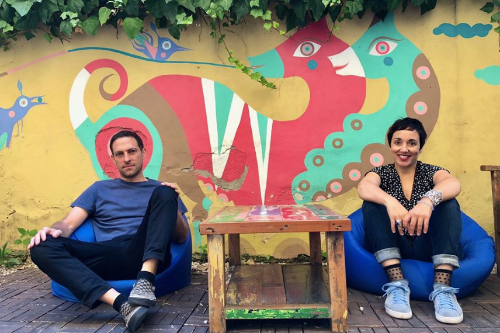
How did you get into the hostel industry?
Steve: In the early 90’s I had a series of odd jobs in Rome and one of them was in a hotel/hostel. I worked there for a couple of seasons over a few years and then moved to LA and got a job in a student travel agency. While I was over there, I couldn’t stop thinking about accommodation in Europe and how the internet was going to change budget travel.
Linda: I graduated from university and for years wandered aimlessly from one job to the next. I was living in Los Angeles and working at the Writers Guild of America and even though it was a stable well-paying job, I was miserable. I read loads of self-help books, took various assessment tests, talked to a career counsellor, but I couldn’t find that “thing” it was that I wanted to do with my life. In 1998, Steve and I were on our honeymoon in Rome and we decided to move here and open a hostel – that’s when things fell into place and I finally felt “this is it!”. So in 1999, we created a website for our hostel before we even had an address and moved here with no money except credit card advances, no connections, basic Italian language (Steve) and no knowledge of the language at all (me). We rented a small place, put beds together and opened for business. We moved to our current location in 2002.
What do you think small hostels like The Beehive can offer that larger hostels cannot? What do you offer that sets you apart from competitors?
Steve: When you’re small like us, you can give your guests a lot of personal attention. Our dinners are like dinner parties with friends or family – gatherings where you can have meaningful conversations and really get to know someone. Our place is small, cosy and intimate and I think that’s hard to reproduce on a large scale. In our case, The Beehive is an extension of our personality and who we are. It’s not a customer service procedure that people have been trained to perform. I think it’s getting rarer to find small businesses and personal connections in general and I think a lot of people seek it out and others don’t even realize it exists until they experience it at a place like ours.
Linda: Small hostels offer a lot of direct personal attention and in our case, you interact with the actual owners. Guests often think we live here and I don’t mean that with negative connotations. You can’t get that homey feeling from a large hostel no matter how they try. As far as what sets us apart from our competitors, I imagine it’s our size and our personality – the fact that we are vegetarian and eco-conscious and have been for many years before it became trendy. We’ve always done what feels right to us and what we believe in – whether it’s the wisest or most profitable business decision or not.
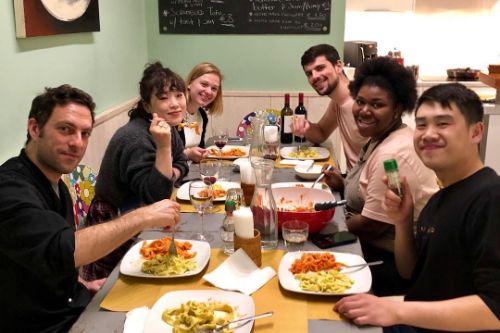
So many of your reviews mention that The Beehive is like a ‘home away from home’ – how have you guys created this vibe and what do you do to ensure all guests experience this?
Steve: I believe that good interior design and well-managed spaces can foster interaction between people. Having visually compelling and interesting spaces is important – both when trying to stand out from the competition in the booking process and for being memorable once there – but comfort can be hard to create through design alone. A home feels different when it’s lived in, and home feels different from other places. What makes it feel that way? I think it’s just something that happens when you actually do kind of live there and treat it like your extended home. The Beehive is very much my own home away from home, and not just a business, so it seems natural that others would feel that way too.
Linda: We’ve always called The Beehive our first baby and we’re as protective and caring of it as we are with our own children. We didn’t have an interior design team come and tell us how to make our place homey. We just put things together that we liked and it has grown organically over the years using art pieces from friends and former guests, photos of our children and of friends – just being surrounded by things we like and have pieced together over the years.
We love that The Beehive takes the impact they have on the environment seriously – can you share more on what environmentally-friendly measures you take and why it is important to you?
Steve: There’s a difference between business people who happen to own a hostel and hostel owners or managers who, among other roles, have to be business people. In the first case, decisions have to pass the criteria of whether they are good for business, which too often in the case of big-budget projects, can be measured solely in financial profit. In our case, our decisions are based on a combination of what’s good for us, the environment, and our guests – and sometimes doing what we personally believe is right isn’t best for our bottom line. But that’s okay – we don’t have to convince a financial department or board of anything we do. As for our eco-consciousness, we do the basics such as avoiding toxic cleaning products, reducing waste and recycling. Our cafe is organic, vegetarian and practically waste-free.
Linda: Back in 2004, I became very interested in Buddhism and environmentalism. Both totally resonated with me and I knew that was the path I wanted to follow in my life. I became vegetarian and started carrying out environmentally friendly practices at home and these extended into our business and have continued like that to this day. There are more eco-practices we have always wanted to implement at our hostel, but which aren’t possible in our particular circumstances however we do what we can. We use eco-friendly cleaning products, recycled paper products and use organic ingredients in our cafe including organic fair trade coffees & teas and organic milks. We try to limit food waste, don’t sell bottled water and promote drinking tap water. Around our hostel, we have LED lighting, have installed eco shower heads, repurpose furniture and we host clothing and book swaps to encourage people to reuse rather than throw out or buy new. In regards to tourism, we suggest to guests that they visit landmarks in Rome that are not as densely visited and to eat Roman dishes at local restaurants (not McDonald’s or other chains).
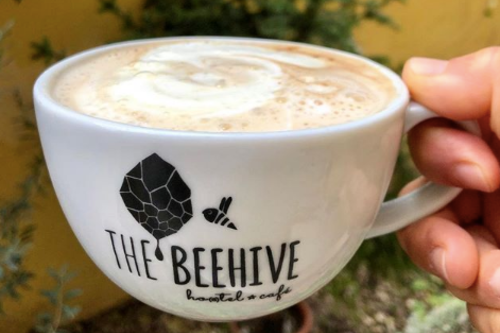
Can you share more about your app? Why did you decide to create it and do you find that a lot of your guests use it?
Steve: We’ve always thought that travel is about the people you meet and the information you get. It’s what turns any trip from mediocre to amazing. Giving great advice and knowing what places and what experiences are really worthwhile and can enhance someone’s impression of the city has always been something we focus a lot on. The content from our app started as a few pages to a printed booklet, and then eventually – when technology permitted – we put it all in an app, which is much easier to manage and use. We get a ton of comments about how great it is so yes, I think guests appreciate it a lot and find it very useful.
Linda: A trip is only as good as the information you receive and actually use and that’s the great thing about hostels. Most people who work in hostels are locals who can provide the kind of information which leads to an amazing experience, eating delicious food, finding out about hidden gems and avoiding any possible pitfalls with useful practical information and insider tips. That’s why we created our printed guide years ago that was called “The Beehive Recommends” which answered frequently asked questions and also gave our own personal recommendations. Having it in an app form over the last several years has been great because now people can use maps to navigate to these places which weren’t possible before.
What are your predictions for the future of the hostel industry?
Steve: We’ve been doing this for over 20 years and we’ve seen a lot of changes brought on by technology, whether it be Tripadvisor and the advent of online reviews or Airbnb and home “sharing”. A lot of these changes have helped improve the quality of hostels but we were considered a “luxury” hostel from day one, so the upward movement in hostels overall and departure of many from the grungy backpacker places has only brought us more competition and has diluted what we’ve always done. I can’t say any of the changes to the industry have ever been anything that’s really helped us out a great deal so even though it sounds negative, I have to assume that future changes will continue to make things more difficult for small independent hostels. I hope the hostel industry can once again become synonymous with budget/youth travel like it once was, but it seems Airbnb has taken that slot for now.
Linda: Over the last 20 years, I’ve seen a trend towards large hostel chains and designer hostels and big money behind that. From word of mouth to guidebooks to the internet and from booking direct with owners to booking through third parties, there’s been a huge amount of change. Third parties are now a handful of colossal players who buy up all of our hard-earned visibility simply because they can afford to do it. That’s definitely not a good thing for hostels and may eventually be the death knell for small hostels. I don’t really have any predictions for the future but just try to focus on what we’re doing right now and try to do the best we can. I do have a kind of “blinders” approach to running our business in that I try not to focus too much on what others are doing. As a small mom & pop business though, there’s not really much we can do about the changes that have been brought on by large corporations, so we just keep riding the wave of our business and see where it continues to take us.
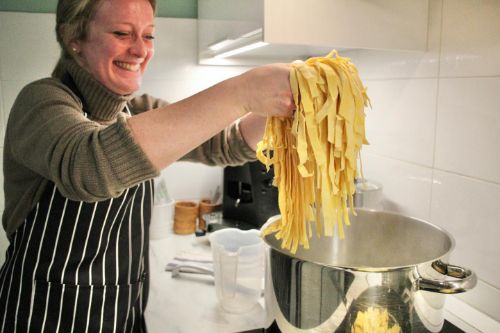
What is your favourite thing about working in the hostel industry
Steve: The people. I feel like I’ll never age at The Beehive. I’m constantly around people in their 20’s and I know that at some point they’ll be like, “What’s this old guy doing here?” but for the time being, I still relate to people and enjoy their company no matter how old, or young, they are. It’s a mindset that we have in common and those who prefer hostels are my kind of people. I also get great pleasure in cooking for others which I do for our guests a couple of times a week. For me, it’s like a show of affection, so our dinners are very personal.
Linda: I know it will sound totally sappy, but I really enjoy just being kind to people and being helpful. For many of our guests, it’s their first big trip away from their home country or perhaps they are travelling solo and if they are female, a lot of them are very nervous about it. I like to ease their minds and provide a safe haven for them – I am a mom with three daughters after all! We also feel very connected to the local and international community here in Rome and our doors are always open. We host a monthly storytelling event that brings in a lot of English speaking locals including Italians who come to share personal stories based on a theme and it’s become a really special lovely community of people. We have friends and acquaintances who come and do filming in our garden or come in and do some work before catching a train. While we feel very much a part of travel and tourism – what we feel more a part of is hospitality overall and taking care of people – visitors and locals alike.
What does the future look like for The Beehive?
Steve: I don’t know if we ever imagined what it would be like to celebrate 20 years in business so I feel like we’ve already experienced, to some degree, the strangeness of arriving farther into the future than we imagined. At the most basic level, I hope we’re here for a long time to come and still relevant and well known and that people like us. At the more ambitious level, I’d like to see us be able to expand – perhaps in another city – and get to a point where we can enjoy more time off. Perhaps one day one of our kids will want to step in and take The Beehive to the next level – that would be pretty cool to see.
Linda: My wish is very much like Steve’s. I want to continue to be in business and hope people will continue to want to stay with us, that we stay relevant and that people will still enjoy and recommend what we offer. I would like to get to a point where we don’t have to work as many hours as we do now at the front desk and are able to work on other projects which include spending time with guests out and about rather than limited at reception. We have always wanted to expand to another city and so I do hope that happens someday. I would love to have one or more of our daughters want to be a part of the family business – that would be very cool indeed.
Catch up with our previous interviews with Gal Mor from Abraham Hostels and Dror Tirosh from Loki Hostels.
